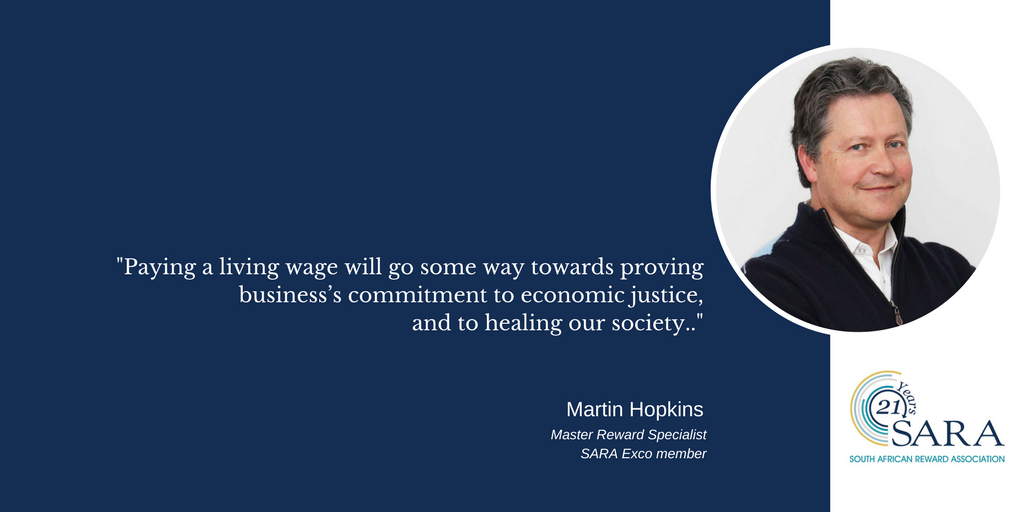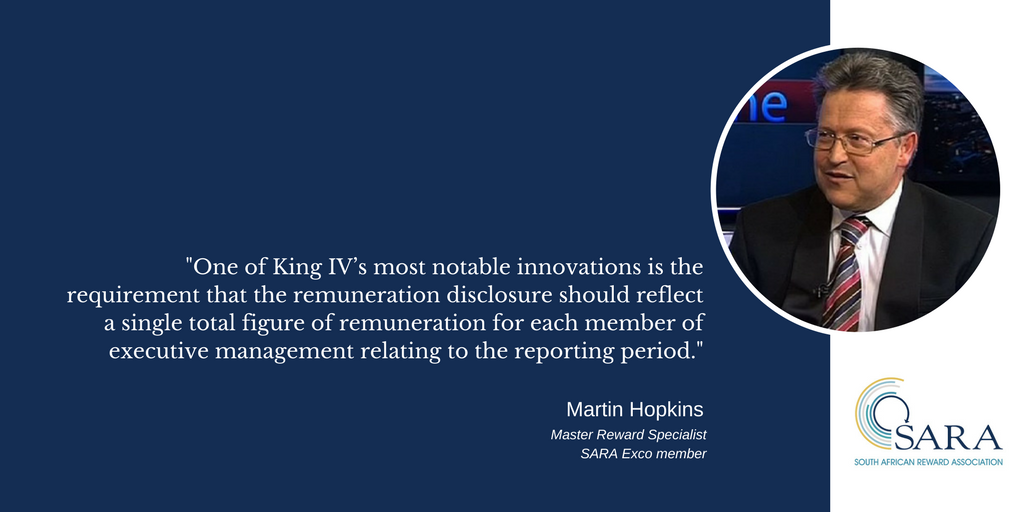|
To mark Human Rights Month, the South African Reward Association (SARA) is calling for business to look beyond the national minimum wage agreement, and vigorously explore ways to implement a living wage. The phenomenon of “the working poor” is fuelling the ongoing resentment and violent industrial action that increasingly bedevils South African business, says Martin Hopkins, Master Reward Specialist, Executive Committee Member at SARA and partner at PWC in the People & Organisation practice.
“In many senses, the national minimum wage is something of a red herring, because it could distract companies from the need to work towards paying a living wage, rather than just a minimum wage,” says Mr Hopkins. He argues that the minimum wage does not allow employees to live a decent, dignified life, and employers should therefore devote attention to how to do so. While there is no consensus about what a living wage in South Africa is, it is certainly substantially above the R3,500 minimum wage. Cosatu’s Patrick Craven says that the working poor earn anything below R4,125 a month; Mr Hopkins says a true living wage is probably in the region of R10,000 – R 12,000 per month, although there is no “official” living wage figure for South Africa. The British figure is £7-8 per hour. He cautions however that these adjustments to worker pay need to be done in an economically sustainable way, and that being good stewards of shareholders’ money is also an ethical imperative for directors. Disclose both top and bottom pay A consequence is that companies and society as a whole pay a great deal of attention to the rate of executive pay. In fact, companies would find it hard if not impossible to attract top talent if they did not pay a market-related rate. He thus recommends paying this rate in order to attract leaders of the right calibre but to structure packages carefully to align reward and performance. “An equally intense focus on what the lowest earners are paid would actually tell one more about the true remuneration ethics in play within the company,” he says. “I believe that companies that are serious about the wage gap and poverty will increasingly disclose both their top and bottom wage-earners, and the detail of what they are doing to assist those at the bottom to manage their money better.” Understand the benefit of paying living wage Research by the United Kingdom-based Living Wage Foundation shows that 93 percent of companies that have implemented a living wage have seen benefits: 86 percent cite reputational benefit, 75 percent say it has increased motivation and retention rates, while 64 percent identify differentiation as a positive. Particularly relevant for South Africa with its adversarial labour relations, 58 percent say that paying a living wage improved relations between managers and staff. “Paying a living wage is as much about enlightened self-interest as anything else,” Mr Hopkins comments. “Poverty and the resulting social instability are huge issues that have direct, immediate repercussions for companies, but they also affect the overall business environment. Paying a living wage will go some way towards proving business’s commitment to economic justice, and to healing our society.” ENDS MEDIA CONTACT: Juanita Vorster, 079 523 8374, [email protected], www.atthatpoint.co.za For more information on SARA please visit: Website: www.sara.co.za Twitter: @SA_reward LinkedIn: South African Reward Association Facebook: SARA – South African Reward Association
0 Comments
The South African Reward Assocation (SARA) has launched A guide to the application of King IV™: Principle 14 - Governance of Remuneration. The guide was co-authored with the Institute of Directors in Southern Africa (IoDSA) and is intended to help reward specialists – as well as members of governing bodies and other stakeholders – better understand and apply the principles of King IV in regard to remuneration.
“Many reward specialists struggle with the practical application of the remuneration principles and recommendations of King IV,” says Martin Hopkins, Master Reward Specialist and Exco member of SARA. “A particular sticking point is the reporting of the organisation’s remuneration policy and the implementation report, especially given King IV’s emphasis on increased disclosure.” Hopkins joined his fellow SARA Exco members and Master Reward Specialists Morag Phillips and Laurence Grubb in launching the Guide at a breakfast attended by 150 reward professionals who are responsible for the design, development and implementation of reward strategies, policies and processes that will support organisational strategies. King IV is only applicable to integrated reports relating to financial years ending after 1 October 2017. The first King IV-compliant remuneration reports are only now being published. These reports will be the first examples for professionals to learn from. One of King IV’s most notable innovations is the requirement that the remuneration disclosure should reflect a single total figure of remuneration for each member of executive management relating to the reporting period. This single figure should encompass the salary, benefits, short-term and long-term incentives and any other remuneration elements. The values for the short and long term incentives should be reflective of the period of performance covered in the annual report and not necessarily of the time of payment. The idea being that the reader can relate the payments to the performance during that period. The single figure follows broadly the principle established in the United Kingdom, and now part of its company law. It is intended to make it much easier for stakeholders to establish what remuneration an individual received during the reporting period, and to compare this with performance. The single figure also makes it easier for readers to compare remuneration across reporting terms. A fundamental principle of single-figure disclosure is to identify when remuneration is received or receivable, in order to enable this comparison between remuneration and performance during a specific period. King IV also requires unvested awards to be reported, again in order to promote transparency and to give stakeholders a clear indication of future liabilities contingent on the performance targets being met. Establishing these values can be complex, says Hopkins, because many performance incentives have a number of variables, such as vesting dates and valuations, and may refer to share prices or other measures. The Guide details the principles informing how each of these elements should be disclosed. More broadly, the Guide contains detailed notes on each of the Recommended Practices relating to King IV’s Principle on remuneration (Principle 14). Remuneration is an important performance driver, but a remuneration policy that is unfair or is perceived to be unfair can negatively impact an organisation’s sustainability and it’s shareholder voting. King IV aims to provide a framework for achieving a fair and effective remuneration policy that can be defended convincingly. “However, it is a complex area and sufficient implementation will only be achieved over time and as the result of focused effort by the remuneration committee. This Guide is designed to provide practical help to achieve the outcomes envisaged by King IV.” The Guide is available at http://www.sara.co.za/sara/file%20storage/Documents/2017/Nov/KingIVGuide_ToTheApplicationOfRemunerationGovernance.pdfwww.sara.co.za/sara/file%20storage/Documents/2017/Nov/KingIVGuide_ToTheApplicationOfRemunerationGovernance.pdf ENDS MEDIA CONTACT: Juanita Vorster, 079 523 8374, [email protected], www.atthatpoint.co.za For more information on SARA please visit: Website: www.sara.co.za Twitter: @SA_reward LinkedIn: South African Reward Association Facebook: SARA – South African Reward Association |
Archives
March 2023
Welcome to the South African Reward Association newsroom.
Categories
All
|



 RSS Feed
RSS Feed